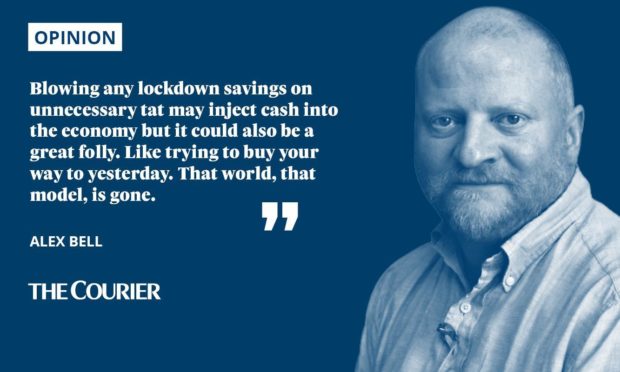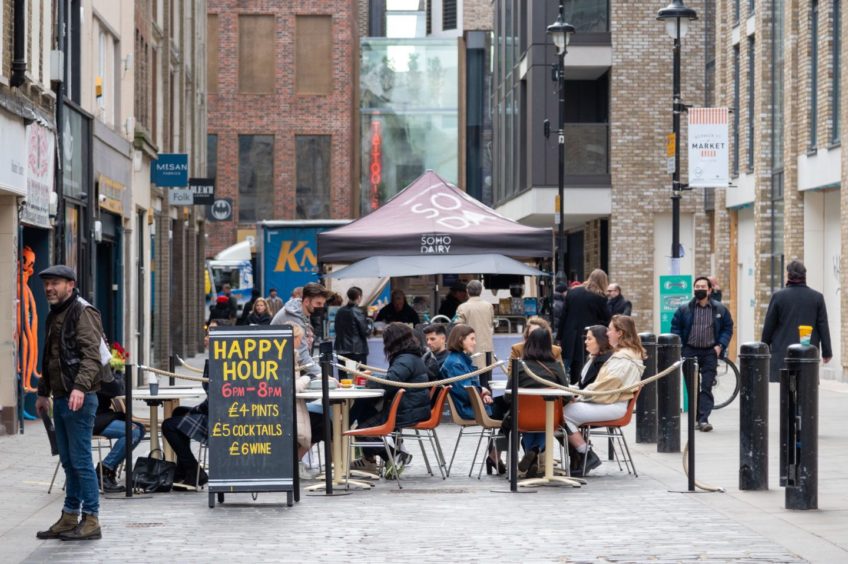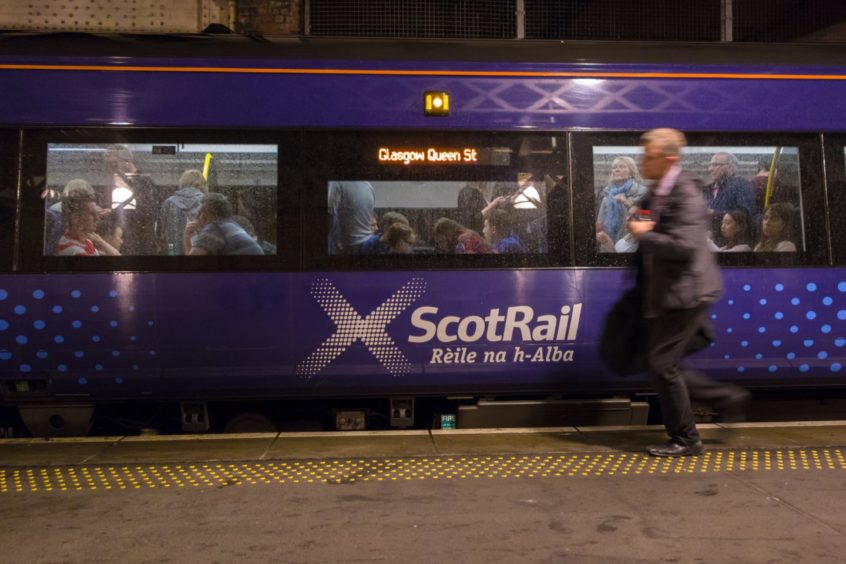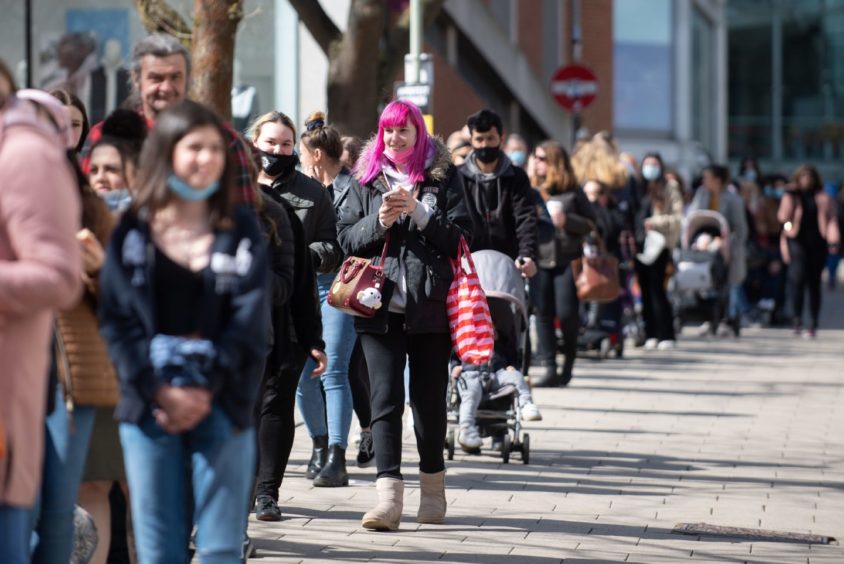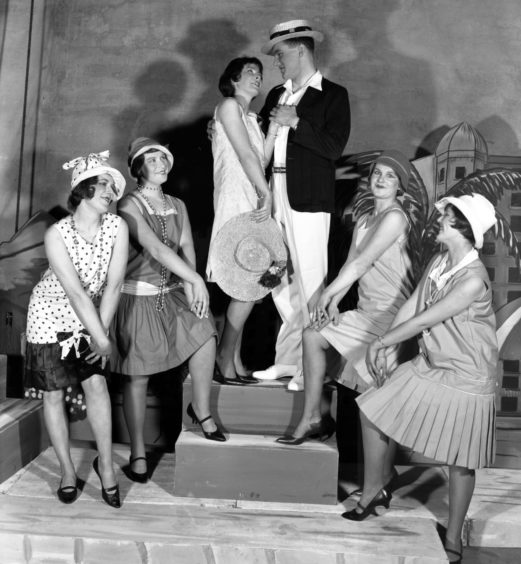Tomorrow we can meet up, outside, in small groups, without a drink or food. No kissing though, or standing too close, however cold it gets.
What sounds like a camping holiday from 1972 will be a delight. Freedom Friday; the beginning of the end of lockdown.
Scenes from England show people queuing outside shops and getting drunk in the street. Looks like the old normal.
We are being urged to go out and spend. Lockdown has kept billions in the bank and we need to scatter it like ticker tape on the cavalcade of consumption. All of which sounds like fun.
The Office of Budget Responsibility reckons there is an extra £180 billion in savings thanks to lockdown keeping us away from the high street. The Bank of England and politicians would like us to spend this so the UK can “bounce back”.
However the other big story of lockdown is that in some ways society has leapt 10 years forward. We have achieved in one year what was expected to take a decade in terms of how we work, shop and behave.
Bounce back, to what?
Much less traffic on the road cuts carbon gases. Working from home is better for the environment. Better for the soul too.
The rat race stopped, and that was nice. We missed the pleasure of consumption – holidays and restaurants – but equally sighed relief at not having to breathe office odour.
Perspective was imposed on us. We became a little bit wiser about life.
Which makes bounce back an ambiguous thing – back to what. And more importantly, if we have moved on, is there any back to bounce to?
Western habits were already changing. If you had wealth, your diet, work life, leisure habits and home were different to those of the generation before.
The shift to online banking and trading, the death of many service jobs, the rise of automation, the profound change in how the economy is structured. It had all begun, and it just hurried up.
Blowing any lockdown savings on unnecessary tat may inject cash into the economy, but it could also be a great folly. Like trying to buy your way to yesterday. That world, that model, is gone.
There will be things we’d all like to buy now – those holidays, the finest wines in the most decadent of restaurants – but if we have moved on 10 years, then the workplace has permanently become more insecure.
You’ll need your savings more than ever. Tomorrow is set to be less secure.
We have experienced the greatest act of welfare spending in peacetime history. The great Covid benefits bonanza wasn’t aimed at people in poor housing, but at the suburbs and the city centres.
For once, nobody objected. Funny that.
Support can’t continue
Employment has held up during lockdown, helped by government schemes. This is unlikely to continue.
When the state cash gets pulled, many jobs will go. Employers either can’t afford to keep staff or have found more efficient ways to operate.
The institute for government estimates that Covid has cost the state nearly £400 billion in handouts and lost taxes.
This will have long term damage on the government’s ability to look after you.
Welfare states were already in retreat, in part because the tax base was no longer funding the benefits. That can only get worse.
They are hoping a great splurge by the British people on fast fashion and disposable junk will obscure this. They are asking you and I to take a risk to cover up their failure of leadership. Don’t do it.
To recoup the money in the short term through tax rises is popularly thought to stifle recovery, so the tax hike would have to come later. But no electorate wants that, so the national debt is likely to stay high.
That will be used by future governments as a reason to spend less. The talk of a roaring twenties as we bounce back might prove true, but the chance of a terrible hangover is higher.
Politicians urging households to spend their savings are really admitting they’ve run out of ideas and levers to help the economy.
They are hoping a great splurge by the British people on fast fashion and disposable junk will obscure this.
In short, they are asking you and I to take a risk to cover up their failure of leadership. Don’t do it.
While lucky households have more savings, many have none. Across the west, lockdown has highlighted the great divide in our society. The well off are better off, the poor poorer.
Nowhere is this more obscene than in the Covid profiteers, the big tech companies that have boomed from online trading, the corporations who have sucked up public cash while avoiding tax.
Just like war profiteers they have exploited the misery of unavoidable events to make themselves rich.
The individual citizen is more vulnerable economically, while the super rich are more secure
No politician recommends those who have really benefited from lockdown spend, or are taxed, to help the bounce back.
The individual citizen is more vulnerable post lockdown, economically, while the super rich are more secure.
Sounds like the old normal. Funny that.
